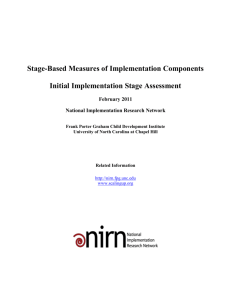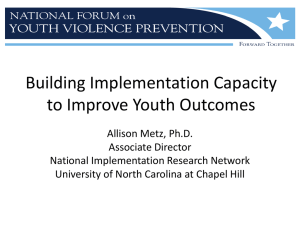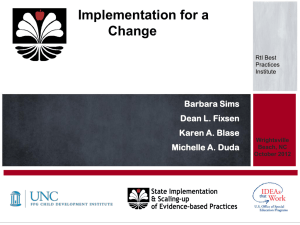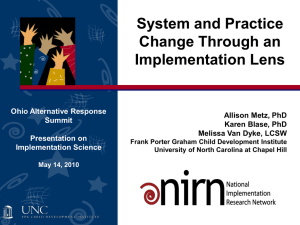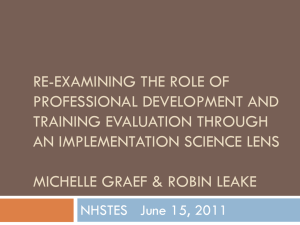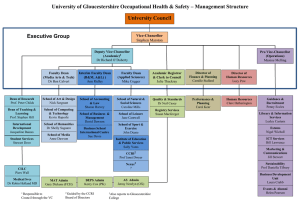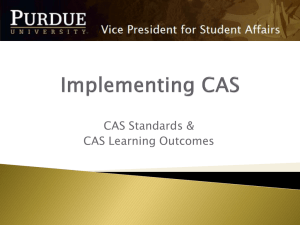The Science and Practice of Implementation
advertisement
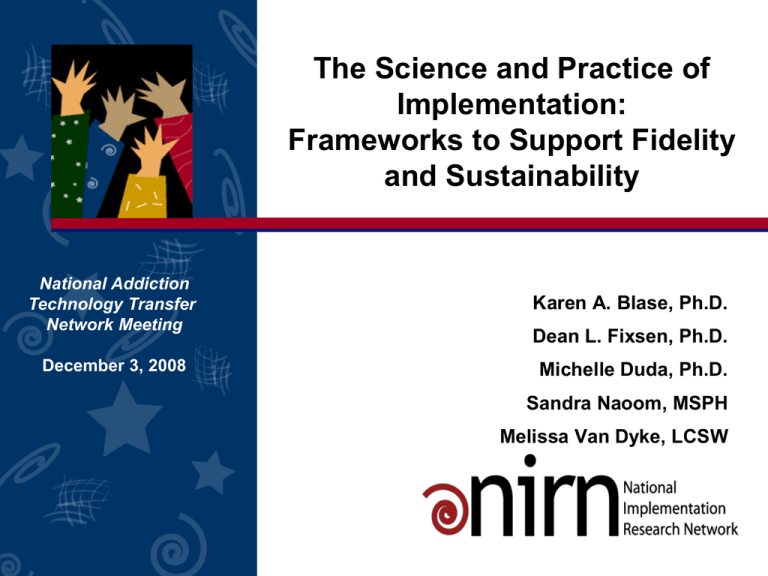
The Science and Practice of Implementation: Frameworks to Support Fidelity and Sustainability National Addiction Technology Transfer Network Meeting Karen A. Blase, Ph.D. December 3, 2008 Michelle Duda, Ph.D. Dean L. Fixsen, Ph.D. Sandra Naoom, MSPH Melissa Van Dyke, LCSW Evidence Based Movement The “evidence-based movement” is an international experiment to make better use of research findings in typical service settings. The purpose is to produce greater benefits to consumers and society. Copyright © Dean L. Fixsen and Karen A. Blase, 2008 We want to: Reliably produce… …predictable and positive outcomes for children, adolescents, adults, families, and communities …that improve every year …for the next 50 years Copyright © Dean L. Fixsen and Karen A. Blase, 2008 Implications for the ATTC Network What Might “This” Mean for Our Mission, Way of Work, Leadership ?? The Science of Implementation The Practice of Implementation The Work of Change at Many Levels Practice Organization Systems Copyright © Dean L. Fixsen and Karen A. Blase, 2008 Problem Adults, adolescents, children and families cannot benefit from interventions they do not experience Copyright © Dean L. Fixsen and Karen A. Blase, 2008 What Works INTERVENTION IMPLEMENTATION Effective NOT Effective Copyright © Dean L. Fixsen and Karen A. Blase, 2008 Effective NOT Effective Performance Implementation (High Fidelity) Paper Implementation Procedure Implementation (Low Fidelity) Learning About Effective Implementation Craft knowledge National meeting of EBP Program Developers National meeting of EBP Implementation Sites National meeting of Implementation Researchers Interviews with 64 Program Developers Work with Program Developers, States, Agencies Formal and scientific information Program Efforts and Replication Data Review of evaluation and research literature related to implementation Publication of Implementation Research: A Synthesis of the Literature (2005) WHAT HAVE WE LEARNED? Copyright © Dean L. Fixsen and Karen A. Blase, 2008 There are Challenges Science to Service Gap What is known is generally not what is adopted Implementation Gap There are not clear pathways to implementation What is adopted often is not used with fidelity and good effect What is implemented disappears over time and with staff turnover Copyright © Dean L. Fixsen and Karen A. Blase, 2008 There are Shared Challenges!! Implementation is implementation is implementation in: • • • • • • • • • • Agriculture and Forestry Manufacturing and Business Substance abuse Child welfare, Education, Engineering, Health and Medicine Juvenile Justice, Mental health, Nursing, …and more The commonalities are striking. Copyright © Dean L. Fixsen and Karen A. Blase, 2008 There Are Shared Challenges!! Despite tremendous variability in the content and context across domains…. They have similar implementation problems They have similar implementation solutions We can learn more …more quickly Copyright © Dean L. Fixsen and Karen A. Blase, 2008 Positive Intervention Outcomes ≠ Implementation Implementation has not been achieved by doing more or better research on interventions. The usability of a program or practice has nothing to do with the weight of the evidence regarding that program –“Evidence” on effectiveness helps you select what to implement for whom –“Evidence” on outcomes does not help you implement the program Copyright © Dean L. Fixsen and Karen A. Blase, 2008 Insufficient Methods Diffusion/dissemination of information by itself does not lead to successful implementation Training alone, no matter how well done, does not lead to successful implementation Policies and funding alone do not lead to successful implementation Copyright © Dean L. Fixsen©and Karen Fixsen, A. Blase, 2008 Dean Karen Blase, Robert Horner, George Sugai, 2008 New Knowledge Successful implementation on a useful scale requires a purveyor An individual or group of individuals representing a program or practice who actively work to implement that practice or program with fidelity and good effect Purveyors accumulate data & experiential knowledge, more effective and efficient over time Copyright © Dean L. Fixsen and Karen A. Blase, 2008 Implementation Framework Organizational Structures/Culture Practitioner Purveyor Evidence-based Practices Fidelity and Outcome Measures Fixsen, Naoom, Blase, Friedman, & Wallace, 2005 Copyright © Dean L. Fixsen and Karen A. Blase, 2008 Implementation Framework Organizational Structures/Culture Infrastructure (Train, Coach, Evaluate) Purveyor Evidence-based Practices Fidelity & Outcome Measures Fixsen, Naoom, Blase, Friedman, & Wallace, 2005 Copyright © Dean L. Fixsen and Karen A. Blase, 2008 Active Purveyor Role Simultaneous, Multi-Level Interventions Purveyor Practitioner Organization Management (leadership, policy) Administration (HR, structure) Supervision (nature, content) System of care State, County and Local Context Copyright © Dean L. Fixsen and Karen A. Blase, 2008 Purveyor AND Intermediary Structures and Strategies Simultaneous, Multi-Level Interventions Intermediary Purveyor and Practitioner Organization Management (leadership, policy) Administration (HR, structure) Supervision (nature, content) System of care State, County and Local Context Copyright © Dean L. Fixsen and Karen A. Blase, 2008 Fidelity Matters Higher Fidelity is correlated with better outcomes across a wide range of programs and practices Adult Mental Health – ACT, IPS, IDDT Medicine – DOTS, Texas Algorithm, OMAP Children’s Services – FFT, MST, Wraparound, TFM Education – HiPlaces, SWPBS, STEP School-Based MH Prevention Programs PATHS Copyright © Dean L. Fixsen and Karen A. Blase, 2008 Implementation Successful scale-up requires attention to the science and practice of implementation Requires change at the Practice Level (Clinician, Front-line Staff, Counselor) Organization Level (Supervisor, Administrator) System Level (Funders, Government, Regulatory Bodies) Copyright © Dean L. Fixsen and Karen A. Blase, 2008 Implementation Frameworks Multi-dimensional, Fully integrated Implementation Drivers Implementation Stages Implementation Teams Improvement Cycles Stages of Change Copyright © Dean L. Fixsen and Karen A. Blase, 2008 Implementation Frameworks Multi-dimensional, Fully integrated Implementation Drivers Implementation Stages Implementation Teams Improvement Cycles Stages of Change Copyright © Dean L. Fixsen and Karen A. Blase, 2008 Consumer Benefits Performance Assessment (Fidelity) Coaching Competency Training Selection Implementation Lens © Fixsen & Blase, 2008 OUTCOMES (% of Participants who Demonstrate Knowledge, Demonstrate new Skills in a Training Setting, and Use new Skills in the Classroom) Knowledge Skill Demonstration Use in the Classroom Theory and Discussion 10% 5% 0% ..+Demonstration in Training 30% …+ Practice & Feedback in Training 60% 60% 5% …+ Coaching in Classroom 95% 95% 95% TRAINING COMPONENTS 20% 0% Joyce and Showers, 2002 Sobering Observations "All organizations [and systems] are designed, intentionally or unwittingly, to achieve precisely the results they get." R. Spencer Darling Business Expert “The tyranny of the status quo.” Fritz Oser Educator Copyright © Dean L. Fixsen©and Karen Fixsen, A. Blase, 2008 Dean Karen Blase, Robert Horner, George Sugai, 2008 Consumer Benefits Performance Assessment (Fidelity) Coaching Competency Training Selection Systems Intervention Organization Facilitative Administration Decision Support Data System © Fixsen & Blase, 2008 Consumer Benefits Performance Assessment (Fidelity) Systems Intervention Coaching Competency Adaptive Organization Facilitative Administration Training Selection Technical Decision Support Data System Leadership © Fixsen & Blase, 2008 Consumer Benefits Performance Assessment (Fidelity) Systems Intervention Coaching Competency Adaptive Training Integrated & Compensatory Selection Technical Organization Facilitative Administration Decision Support Data System Leadership © Fixsen & Blase, 2008 Implementation Frameworks Multi-dimensional, Fully integrated Implementation Drivers Implementation Stages Implementation Teams Improvement Cycles Stages of Change Copyright © Dean L. Fixsen and Karen A. Blase, 2008 Consumer Benefits Stages of Implementation •ExplorationPerformance Assessment (Fidelity) •Installation Coaching •Initial Implementation Innovation Adaptive Training •Full Implementation •Innovation Integrated & Compensatory Selection •Sustainability Systems 2 – 4 Years Intervention Technical Organization Facilitative Administration Decision Support Data System Leadership Fixsen, Naoom, Blase, Friedman, & Wallace, 2005 Implementation Frameworks Multi-dimensional, Fully integrated Implementation Drivers Implementation Stages Implementation Teams Improvement Cycles Stages of Change Copyright © Dean L. Fixsen and Karen A. Blase, 2008 Implementation Science Letting it happen Recipients are accountable Helping it happen Recipients are accountable Making it happen Implementation teams are accountable Based on Greenhalgh, Robert, MacFarlane, Bate, & Kyriakidou, 2004 Copyright © Dean L. Fixsen and Karen A. Blase, 2008 Implementation Team A group that knows the innovation very well (formal and practice knowledge) A group that knows implementation very well (formal and practice knowledge) A group that knows improvement cycles to make intervention and implementation methods more effective and efficient over time Copyright © Dean L. Fixsen and Karen A. Blase, 2008 Implementation Team Prepare Communities Prepare State Systems Prepare agencies and staff Implementation Team Assure Consumer Benefits Consumers & Work with Researchers Stakeholders Create Readiness Copyright © Dean L. Fixsen and Karen A. Blase, 2008 Assure Implementation Implementation Frameworks Multi-dimensional, Fully integrated Implementation Drivers Implementation Stages Implementation Teams Improvement Cycles Stages of Change Copyright © Dean L. Fixsen and Karen A. Blase, 2008 PDSA Cycles Shewhart (1924); Deming (1948); SixSigma (1990) Plan – Develop specific things to do Do – Do them (make sure) Study – See what happens Act – Make adjustments Cycle – Do over and over again until the goal is reached (again) Copyright © Dean L. Fixsen and Karen A. Blase, 2008 Improvement Cycle Uses Rapid Cycle Teams Problem-solving Practice Improvement Transformation Zones PEP – PIP Cycles Copyright © Dean L. Fixsen and Karen A. Blase, 2008 Practice (Do) Policy Policy Enabled Practices (PEP) Feedback Practice Informed Policy (PIP) Policy (Plan) Study - Act “External” System Change Support Policy Practice Feedback Loops Structure Procedure Practice Form Supports Function at every level (National, State, County, Municipal, Agency) System Alignment ALIGNMENT State Department Regions Agencies Practitioners/ Staff Effective Practices FORM SUPPORTS FUNCTION Copyright © Dean L. Fixsen and Karen A. Blase, 2008 Implementation Teams Federal Departments Implementation Frameworks Multi-dimensional, Fully integrated Implementation Drivers Implementation Stages Implementation Teams Improvement Cycles Stages of Change Copyright © Dean L. Fixsen and Karen A. Blase, 2008 Resistance to Change There is no such thing – only inadequate preparation It is not “their” problem, it is ours. Copyright © Dean L. Fixsen and Karen A. Blase, 2008 Stages of Change Pre-contemplation (Say what?) Contemplation (Let me think about it.) Preparation (I think I will do that.) Action (I am trying it now.) Implementation (I am working out the bugs as I try to do it.) Maintenance (Say what?) Hall & George, 1978 Prochaska & DiClemente, 1982 Copyright © Dean L. Fixsen and Karen A. Blase, 2008 Functional Systems Policies Bureaucracy Agencies Staff Outcomes for Children, Families, & Communities Copyright © Dean L. Fixsen and Karen A. Blase, 2008 Summary We need to invest in “what works” – science matters Research results help us “choose” what to implement But “implementation” is a practice and science unto itself Print materials and training alone won’t work Fidelity Matters Selection, Training, Coaching, Fidelity Measures help change and support new practitioner behavior and skills Data systems need to be used to make decisions Facilitative administrative practices & systems interventions create hospitable environments Purveyors and Implementation Teams help with system and service change Policy enables new practice but practice needs to inform policy Copyright © Dean L. Fixsen and Karen A. Blase, 2008 For More Information Karen A. Blase, Ph.D. Dean L. Fixsen, Ph.D. 919-966-9050 919-966-3892 blase@mail.fpg.unc.edu fixsen@mail.fpg.unc.edu At the Frank Porter Graham Child Development Institute University of North Carolina Chapel Hill, NC www.scalingup.org http://nirn.fpg.unc.edu/ http://www.fpg.unc.edu/~nirn/resources/publications/Monograph/ Copyright © Dean L. Fixsen and Karen A. Blase, 2008 For More Information Fixsen, D. L., Naoom, S. F., Blase, K. A., Friedman, R. M. & Wallace, F. (2005). Implementation Research: A Synthesis of the Literature. Tampa, FL: University of South Florida, Louis de la Parte Florida Mental Health Institute, The National Implementation Research Network (FMHI Publication #231). Download all or part of the monograph at: http://www.fpg.unc.edu/~nirn/resources/publications/ Monograph/ Order monograph at: https://fmhi.pro-copy.com/ Copyright © Dean L. Fixsen and Karen A. Blase, 2008
